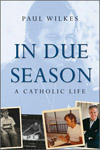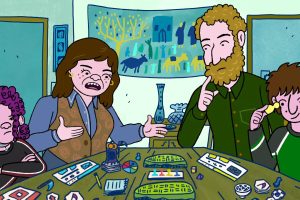By Paul Wilkes (Jossey Bass, 2009)
In In Due Season, Paul Wilkes unpacks his story with a searing honesty that reveals a life filled with the cycles of finding and then losing God. Here the reader gets a personalized story of one man's faith played against the backdrop of changes transpiring in 20th-century American Catholicism.
In this memoir Wilkes describes himself as the anti-Thomas Merton. Whereas Merton found God after an admittedly ill-spent youth, Wilkes was raised a staunch Catholic who contemplated the priesthood only to drift away from the faith and embrace a hedonistic lifestyle.
Still, one can see the thread of Merton's words slowly weaving its way into Wilkes' soul. The closest he came to catching Merton in person was a possible glimpse of his idol at the Trappist Gethsemani Abbey in Kentucky. Following a night of drunken revelry, Wilkes and some pals drove to the abbey but were only able to catch a glimpse of the monks heading off to chapel dressed in their signature white robes and tonsured hair.
Even though he never met Merton face to face, a quiet voice kept calling Wilkes' name, leading him to start walking down some rather unexpected paths. But as soon as he seemed to find his faith footing, Wilkes would venture off again down some self-destructive avenue.
As founder of Christian Help in Park Slope (CHIPS) in Brooklyn, Wilkes lived among the homeless and met Catholic social justice icon Dorothy Day. But then unexpected literary success propelled him to party with New York's literary and artistic elite, including Kurt Vonnegut and Andy Warhol.
As Wilkes writes of his desire to serve God despite his admitted failures, he illuminates our own weaknesses as we try to follow God's will in our own lives. In his story we also catch the glimpses of God that are always calling us on.













Add comment